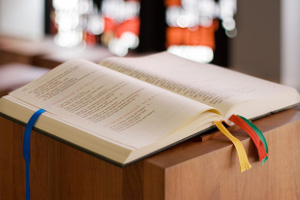 The fascinating feature of the reading from John is that the whole passage long Jesus seems to be avoiding rather than claiming kingship.
The fascinating feature of the reading from John is that the whole passage long Jesus seems to be avoiding rather than claiming kingship.
“Who says that Jesus is king?” seems to be the question in the heart of the passage. Jesus asks Pilate whether the idea of Jesus as king comes from Pilate himself. Pilate disowns it. He is clearly surprised and thought that this claim was Jesus’ own. But now Pilate has to refer to “your nation and chief priests”.
But we know that they did not think Jesus was king. Jesus then goes on to speak of “my kingdom”. Do you have to be king to speak of “my kingdom”? I speak of “my country” without any responsibility in government. Does Jesus say: “my kingdom” as in “the place where I am king” or does he say: “my kingdom” as in “the place where I belong”? When Pilate challenges him and repeats “So you are king”. Jesus avoids claiming this title again. He came not to be “king” but to “testify to the truth”. Now “truth” in John’s gospel comes through Jesus Christ (1:17), is Jesus Christ (14:6), the word of God (17:17) and is something the disciples will be guided into by the Spirit of truth (16:13) after the events of our passage.
But whether or not it is true that Jesus is king: this is not a truth Jesus testifies to in this passage. Jesus does not claim to be king; rather he seems to be asking: Do you want me to be king?
22 November 2015
Jn. 18:33-37
This weekly blog on one of the lectionary readings is by Anne Claar Thomasson-Rosingh, Programme Leader for Lifelong Learning at Sarum College.

Leave a Reply